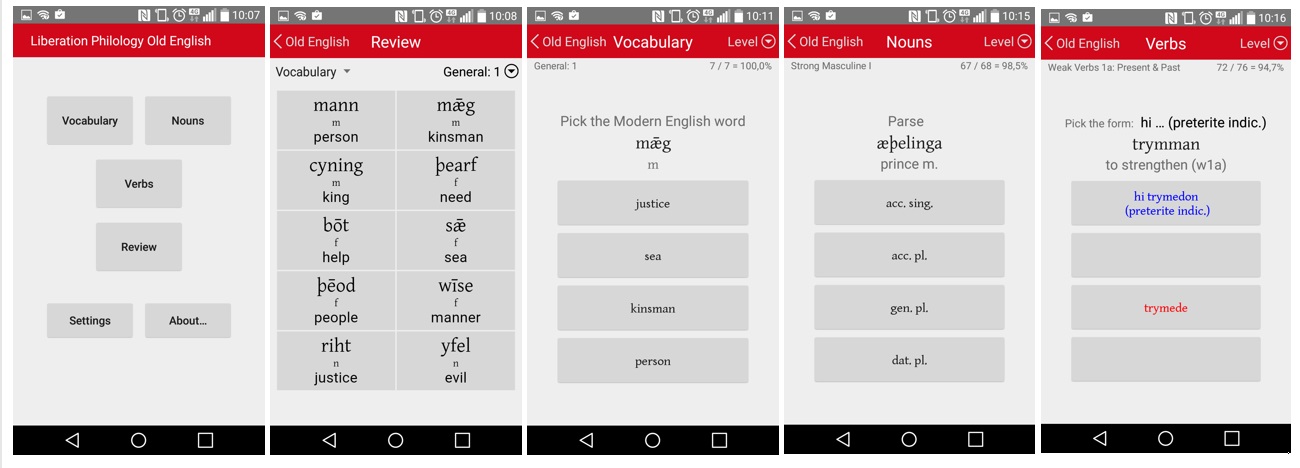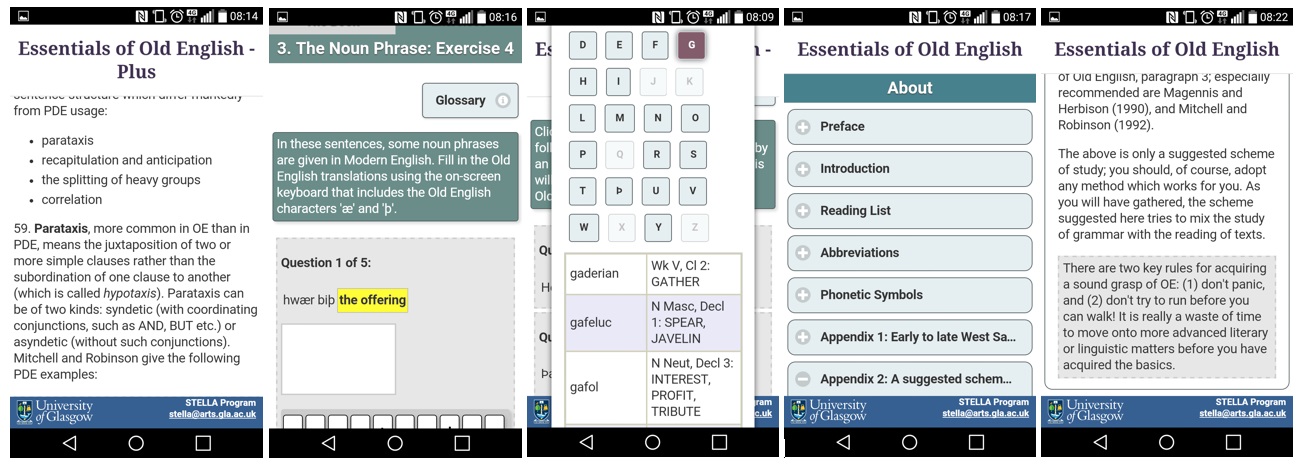In this blog post, I review five apps that bring the early medieval magic of Old English to your 21st-century smartphone. I am not in any way connected to the developers of these apps. Let’s get early medieval on your smartphone!
#5 English Old English Dictionary

What are the Old English words for ‘Chief Justice of the United States’, ‘coffee’ and ‘taekwondo’? If we are to believe this ad-supported dictionary app, the early medieval inhabitants of England would have said: hēahdēmere þāra Geānlǣhtra Rīca, caffiȝ and tæȝcƿondo. Naturally, this is nonsense.
This app is rather clumsily put together – its definition are brief and its list of entries seems rather haphazardly collected (it does have entries for both ‘take a crap’ and ‘take a shit’). No source is indicated for these words and their basic definition, but some of them seem to be derived from Old English Wikipedia pages (such as the one for the Chief Justice of the United States). Despite its potentially interesting functionality of switching between Old English – English and English – Old English, this silly app should be avoided.
Costs: FREE
Android app store link: here
I have not been able to find an iTunes link
#4 Readings in Early English

If you want to practice your Old English pronunciation or you just love the idea of having someone read to you from The Anglo-Saxon Chronicle or the works of Ælfric of Eynsham, this is the app for you!
Readings in Early English was developed by Brian Aitken of the University of Glasgow and was originally intended as a companion piece to the book Essentials of Early English (1999) by Professor Jeremy J. Smith. This app provides access to various Old English, Middle English and Early Modern English texts with translations, minimal explanatory notes and, more importantly, sound files of Professor Smith reading these texts out to you. This means you can read along and listen to what the text may have sounded like. Highly recommended!
Costs: FREE
Link to Google App store: here
Linke to iTunes app store: here
#3 Liberation Philology: Old English

Flappy Bird, Bejeweled, Sewer Run, 2048, Candy Crush… one of the things people use their smartphones for is to play games. Why not spend that time more wisely and train your knowledge of Old English in this quiz app by a company called ‘Liberation Philology’?
This app allows you to spend hours and hours answering multiple-choice questions concerning the parsing of Old English verbs, nouns or pronouns or the translation of words from Old English to Modern English or vice versa. What better way to keep your brains in good shape, improve your grammar skills and master the basic vocabulary of Old English?
The only slight disadvantage to this app I can find is that there is no reward system, other than its keeping track of your average score. Where is my ‘You have answered “–um indicates dative plural five times in a row”-badge!? Also, you have to ‘level up’ manually, rather than advancing to the next level after answering a certain number of questions correctly. For vocabulary, you can go up to level 170; for verbs and nouns you can select specific verbs or noun declensions, or simply select ‘All Verbs: All Forms’ or ‘All Declensions’.
For the polyglots, Liberation Philology also has apps for Gothic, Old Norse and a range of other languages.
Costs: 3,99 EUR/3,99 USD/2,99 GBP
Link to Android app store: here
Link to iTunes app store: here
#2 Old English Dictionary

Who wouldn’t want a nifty, portable Old English dictionary that you can use in the train, while walking your dog or being too lazy to pick up a hard copy dictionary (which would cost you at least ten times as much)?
The Old English Dictionary app, developed by Walter M. Shandruk, is essentially a digital version of the 1889 edition of Joseph Bosworth and T. Northcote Toller’s An Anglo-Saxon Dictionary, combined with Toller’s Supplement, published in 1921. The entries do not only contain definitions, but also quotations and references to texts where the word is used. Although there is a freely available online version of this dictionary at http://www.bosworthtoller.com, I rather prefer the app version: you can use it offline; the app has a custom Old English keyboard that includes the runic character æ and þ; and it is much easier to do a full text search to look up words mentioned in definitions (by using the grey search bar on the top).
Although I am quite happy with this app, there are two minor downsides. One: The dictionary is slightly outdated. For the most accurate lexical information for Old English, you had better turn to the Dictionary of Old English (currently developed by University of Toronto; A-G are available behind a paywall) or Clark-Hall’s Concise Anglo-Saxon Dictionary (4th edn., 1960). Two: If your text does not feature the word as spelled in this dictionary, you are not going to find it. This is rather annoying, when you consider that a word with the vowel ‘y’ can typically be found in texts spelled as ‘i’, ‘ie’, ‘e’, ‘u’ and ‘y’.
Overall though, if you are looking for a cheap Old English Dictionary, this app should make you very ‘appy indeed. Thankfully, it does not contain entries for taekwondo or coffee.
Costs: 3,21 EUR/2,99 USD
Link to Android app store: here
I have not been able to find an iTunes link.
#1 Essentials of Old English

Of course, the best way to learn Old English is to enlist in a University course and be taught and motivated by an enthusiastic tutor. But for those who want to embark on this quest alone, and on their smartphone, Essentials of Old English offers a full Old English manual and workbook!
This app, like Readings of Early English, was developed by Brian Aitken of the University of Glasgow and features basic and advanced explanations of Old English grammar and, most importantly, challenging exercises that will help you master the material. The app is intended to supplement a University-taught course, but it can also be used on its own: tucked away in its ‘About’ section, there is a ‘study guide’ for autodidact students. That study guide refers to ‘texts’ which you will not be able to find in this app, but they happen to be the Old English texts in the Readings of Early English app – so those two apps are very compatible.

The majority of the exercises in this app have you substitute a Modern English word or phrase for the properly conjugated or inflected Old English form. This is a sound way to practise and might even help you to compose some Old English of your own. Some of the assignments can be annoying though, since as a reader you do not always know the Old English equivalent of a Modern English word; let alone its grammatical features (e.g., gender, type of noun, etc.). The app’s built-in glossary, regrettably, only works from Old English to Modern English.
Using this app will give you the bare basics of ‘baby Old English’: like many other text books, the Old English has been normalized to reflect a standardized version of the Early West Saxon dialect- once you explore actual Old English texts, you will find that some of those scribes did not follow the ‘rules’. Be that as it may, a very good app and free to boot!
Costs: FREE
Android app store: here
iTunes app store: here
If you liked this post, why not follow this blog and/or read the following posts about learning Old English?
- Composing Old English: A Do-It-Yourself Guide
- Old English Grammar Videos
- Henry Sweet: The Man Who Taught the World Old English

Thank you for your excellent article, it really helped me.\
LikeLike
Great article. Thank you. I’m already inhaling “Readings in Early English”.
LikeLike